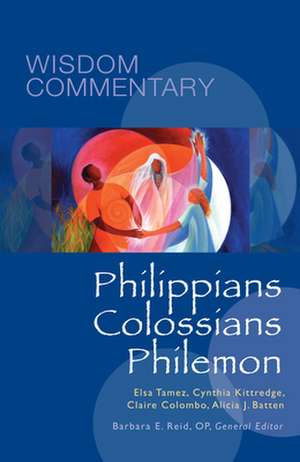Philippians, Colossians, Philemon: Wisdom Commentary
Autor Elsa Tamez, Cynthia Briggs Kittredge, Claire Miller Colombo, Alicia J. Battenen Limba Engleză Hardback – 14 oct 2016
Cynthia Briggs Kittredge and Claire Miller Colombo argue that Colossians's contradictions and complications provide opportunities for entering imaginatively into the world of first-century Christian women and men. Rather than try to resolve the controversial portions--including the household code--they read the letter's tensions as evidence of lively conversation around key theological, spiritual, and social issues of the time.
Taking into account historical, structural, and rhetorical dimensions of Philemon, Alicia Batten argues against the "runaway slave" hypothesis that has so dominated the interpretation of this letter. Paul asks that Onesimus be treated well, but the commentary takes seriously the fact that we never hear what Onesimus's wishes may have been. Slaves throughout history have had similar experiences, as have many women. Like Onesimus, their lives and futures remain in the hands of others, whether those others seek good or ill.
From the Wisdom Commentary series
Feminist biblical interpretation has reached a level of maturity that now makes possible a commentary series on every book of the Bible. It is our hope that Wisdom Commentary, by making the best of current feminist biblical scholarship available in an accessible format to ministers, preachers, teachers, scholars, and students, will aid all readers in their advancement toward God's vision of dignity, equality, and justice for all.
The aim of this commentary is to provide feminist interpretation of Scripture in serious, scholarly engagement with the whole text, not only those texts that explicitly mention women. A central concern is the world in front of the text, that is, how the text is heard and appropriated by women. At the same time, this commentary aims to be faithful to the ancient text, to explicate the world behind the text, where appropriate, and not impose contemporary questions onto the ancient texts. The commentary addresses not only issues of gender (which are primary in this project) but also those of power, authority, ethnicity, racism, and classism, which all intersect.
Each volume incorporates diverse voices and differing interpretations from different parts of the world, showing the importance of social location in the process of interpretation and that there is no single definitive feminist interpretation of a text.
Preț: 292.77 lei
Nou
56.02€ • 58.49$ • 46.36£
Carte indisponibilă temporar
Specificații
ISBN-10: 0814682006
Pagini: 320
Dimensiuni: 152 x 229 x 13 mm
Greutate: 0.64 kg
Editura: Michael Glazier Books
Seria Wisdom Commentary
Notă biografică
Elsa Tamez is a Mexican-Costarrican New Testament biblical scholar. She is a member of the Methodist church and is professor emerita and former rector of the Latin American Biblical University. She earned her ThD at the University of Lausanne, Switzerland. Her most recent publications include Struggles for Power in Early Christianity (2007); No discriminen a los pobres. Lectura de Santiago (2008); El Nuevo Testamento, Palabra por Palabra, interlineal griego-español (2012). Among the awards she has received are Prix de Faculté Université de Lausanne (1990); Award of Excellence in Biblical Interpretation, twice (1996, 1997); Hans-Sigrist Award, University of Bern, Switzerland (2000), for her contribution to contextual biblical hermeneutics.










